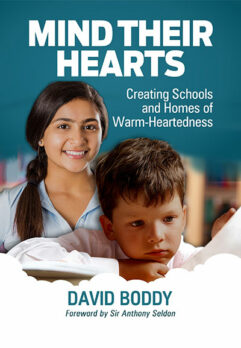Reviewing Mind Their Hearts is a challenge, because it incorporates two different books, demanding two different reviews, or reviewers.
Promising to articulate how our education system can “be made fit for purpose in a rapidly changing world”, the book fails to convince. I’d hoped it would offer ways to combine academic rigour and chances for young people to mature wisely. Instead, academic education was overlooked: it was only mentioned to say we should “not just” prioritise it.
Many of the activities David Boddy suggests rely on a good knowledge of the world, yet the idea that students might benefit from academic education – or that this is part of the school’s role – was omitted. His book left me none the wiser on how we can make our education system fit for purpose in a rapidly changing world, if that system is to continue to teach young people to read, write and have knowledge of that world.
Boddy follows Socrates in arguing that humans know everything before they are born
One reason it fails to offer useful suggestions for our current system is that it relies on an idiosyncratic evidence base. I should not have been surprised to read the unreferenced assertion that “futurologists” in the Department for Education know that seven out of ten jobs young people will go on to do have not yet been invented, but other claims were more surprising.
Boddy follows Socrates in arguing that humans know everything before they are born, and eastern philosophy in arguing that our spirits continue, carrying that knowledge, long after our deaths. I wouldn’t presume to question his faith, but these are doubtful foundations on which to build a curriculum. Yet it is on this basis – and similar points – that much of the book proceeds: children are born happy and wise, the role of education is simply to elicit this, overcoming any “clouds” that limit our “natural state of inner happiness”.
This is the second book within the covers: far more than a work on school leadership, this is a work of spirituality. To those expecting the promised “secular ethical curriculum”, sentences such as: “My inner guide, the Knower, directed me to acquire more heart-opening swan energy and bring the tiger and sloth energies under observation” can come as a surprise. The reason why the book delivers so unconvincingly as a work of educational thought is that it reads more as a set of mantras.
The reason the book delivers so unconvincingly as a work of educational thought is that it reads more as a set of mantras
Even had I shared the author’s beliefs, I might still have found it frustrating. Wandering sentences dogged every page: “Trying to change things can involve pushing uphill or seeking the impossible, whereas the agent of change is within the thing itself.”
The book was repetitious: the value of silence in school was not just mentioned, it was introduced repeatedly, justified and explained each time. And the false assertion that youth unemployment is as high as it’s ever been (it has fallen from 22 per cent in 2011 to about 12 per cent) was compounded by crassly equating it to “what we did to our youths when we sent them to the trenches”.
Both Boddy and Anthony Seldon, who wrote the foreword, emphasise that Boddy would never expect us to agree with him. Boddy argues that we should not judge his prescriptions until we have tried them and that these truths can only be seen once they have been experienced. Sadly, not one word persuaded me to pursue any of these prescriptions.
Paradoxically, I appreciated Boddy’s account of learning-focused efficiency through repeatedly polishing a floor; some of his work as a head intrigued me, including communal music, the teaching of philosophy and headmaster’s question time.
I would not recommend that anyone read this book, but the skeleton of a third book lies within Mind Their Hearts: Boddy’s memoirs, of a career that has included business, education and being Margaret Thatcher’s press secretary, would make a fascinating read. Joining the author on his spiritual journey might prove far more educative than reading its conclusions.













Your thoughts